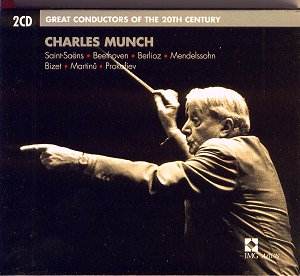The 'Great Composers of the 20th Century' series is
a joint project between IMG Artists and EMI Classics. And most worthwhile
it is proving, since reassessments are being made and new material entering
the catalogue.
This 2CD set of recordings conducted by Charles Munch
features the work of another significant figures in 20th century music.
In his interesting insert note, Marc Mandel points out that Munch succeeded
Koussevitzky at the Boston Symphony Orchestra. Not an easy act to follow,
to be sure, but the fact that Munch remained in his post for fourteen
years, from 1949 to 1962, tells its own tale. It is no surprise, therefore,
that the music collected on these two well filled discs contains a majority
of Boston performances.
The opening item is a rarity, recorded in 1951 in the
early stages of Munch's career in Boston. Saint-Saëns' opera La
Princesse jaune hardly holds the stages of the world's theatres, but
its lively overture is well worth the occasional outing. Munch brings
out the music's innate vitality, and while the sound is somewhat thin,
and far from the best on offer here, the performances exudes vitality.
Altogether more compelling, however, is Beethoven's
Ninth Symphony, which follows on disc 1. The performance has a compelling
vision and sweep, and the recording is rich and warm. The Boston Symphony
Orchestra confirms its legendary credentials as a major international
ensemble, and this is a hugely enjoyable experience, worth the price
of the two discs on its own. The chosen tempi always feel absolutely
right, allowing the music to breathe at the same time as providing an
intense sweep of momentum in the faster sections. In the solo quartet,
including the young Leontyne Price, work particularly well as team,
although it is a pity that the booklet note neglects them (who will
know the credentials of the tenor David Poleri or the bass Giorgio Tozzi,
I wonder?). Also there are no texts or translations, which should have
been included too. The recorded sound is generally pleasing, but in
the finale the balances are sometimes odd, the chorus recessed in the
perspective, wind solos sometimes too loud. In general, however, this
is a really fine performance.
Disc 1 concludes with the earliest of the recordings,
a sparkling Corsaire Overture by Berlioz, in sound which has stood the
test of time better than we might have expected. It isn't hi-fi, though.
Disc 2 opens with the sparkling gossamer textures of Mendelssohn's Octet,
the Boston strings showing their excellent calibre, and the more recent
recording (1960) pays dividends too.
Bizet's Symphony in C is played by the French Radio
Orchestra, and Munch shapes and phrases the music with great affection.
The recorded sound is acceptable enough, making this an enjoyable performance,
if not one to eclipse memories of Beecham's recording with the same
orchestra a few years before.
Martinu wrote his Sixth Symphony for Charles Munch
and the 75th anniversary of the Boston Symphony Orchestra: 'There is
one reason for this work which is clear and certain for me. I wished
to write something for Charles Munch. I am impressed and I like his
spontaneous approach to the music where music takes shape in a free
way, flowing and freely following its movements.' What we have here,
therefore, is the symphony's first-ever recording, made in Boston in
1956, a year after the same forces had given the premiere. Munch recorded
the piece again eleven years later in Prague, but the sound from Boston
in 1956 has come up well in this remastering, helped by what seems a
rich and warm acoustic. Returning to the score a year after the premiere,
orchestra and conductor play it as though they know and love it to a
man. For this is a truly satisfying interpretation of a great symphony.
The collection ends with a selection from Prokofiev's
Romeo and Juliet ballet. The recording is not so satisfying here, with
some odd balances and an occasional lack of bloom. The exciting rhythms
of The Death of Tybalt do not make the impact they can, and of the four
pieces it is the lighter manner of the short movement entitled simply
Dance which comes off best.
Terry Barfoot


